Alumni & Chapter News
ZBTs in Print
Issue: Spring 2018
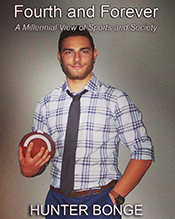
Fourth and Forever: A Millennial View of Sports and Society
Hunter C. Bonge
My book, “Fourth and Forever: A Millennial View of Sports and Society,” looks behind the scenes of the games we love and tackles the issues we face in sports, illustrating how they relate to modern American culture. For instance, we know younger people like soccer while older people like baseball. Why is that? Is this trend here to stay or is it a phase?
The book grew from a list of thoughts that I wrote down over the course of about six months. If I hear something I like while I’m listening to a podcast at the gym or in my car, I’ll make a note. When I’m talking with a friend and something cool comes up, I’ll stop the conversation to make a note. Sometimes I’ll be dreaming about sports, and I’ll jump out of bed to write something on my whiteboard. These notes weren’t meant to turn into something greater, but they became so numerous I felt like I needed a medium to get my thoughts out there.
Most consumers don’t want to read another sports history book. There are so many great ones out there written by experts who have been in this industry a lot longer than me, and they usually focus on a particular athlete or team. My book is about what’s happening right now.
Connecting hot sports trends with our emerging behaviors about media, professional transience, and globalization adds a unique layer. Younger sports fans relate to my views on the current landscapes of football and basketball, while older readers appreciate how I frame sports from traditional perspectives. Casual fans use “Fourth and Forever” for insight, while experts use it as a source of affirmation or debate.
To say that Fraternity has helped me in my career is an understatement. I have a lot going on, but I welcome it. Fraternity ingrains time management into you. If you’re the President, the work takes up at least twenty hours per week if you’re doing it right. On top of that, you have academics, part-time jobs, networking and other opportunities that steal your attention away (especially in Boulder). This is a skill that helped me to get this book done.
Finding the time to put everything on paper was challenging, and tons of sports news comes out every day. The longer I waited, the less relevant some of my points would become. I started writing the day our 2016 season ended and published the book before training camp.
You hear a lot of “no” in sports and entertainment, whether its applying for a job or getting your ideas passed through. Fraternity prepared me for that. Not a lot of people know this, but I lost seven elections my sophomore year before I won President my junior year. That still hurts. I still have that chip on my shoulder as I navigate my way through business. I feel like you need to have that grit in you to compete, because every industry is competitive in its own way.
About the Author
Brother Hunter C. Bonge, Beta Alpha Theta (University of Colorado) 2016, works in communications for the Los Angeles Rams and in marketing for NBCUniversal. He continues to write for The Sports Quotient.
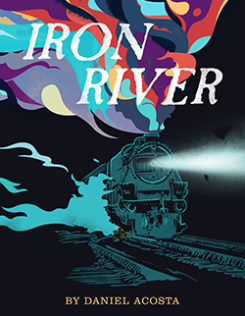
Iron River
Daniel Acosta
Daniel Acosta, Gamma Nu (California State University – Los Angeles) 1969, is releasing his debut novel for young adults, “Iron River,” this summer. The novel, set in a southern California barrio during the summer and fall of 1958, tells the experiences of 12-year-old protagonist and narrator Manny “Man-on-Fire” Maldonado and his three best friends. Throughout the novel the boys wait in terror for the racist cop their barrio has nicknamed the “Turk” to arrest them for the death of a hobo on the nearby railroad tracks, the iron river of the novel.
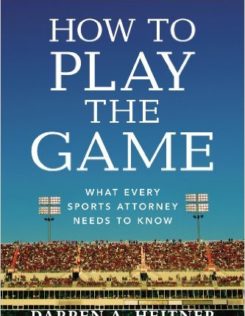
How to Play the Game: What Every Sports Attorney Needs to Know, Second Edition
Darren Heitner
Darren Heitner, Alpha Zeta (University of Florida) 2007, is proud to publish his second book, “How to Play the Game: What Every Sports Attorney Needs to Know, Second Edition”! If you want to play the game, you need to know how to play the game.
Sports law is a niche practice area. It encompasses a variety of disciplines, but also requires knowledge of the inner workings of professional leagues and sports-related statutes in order to be successful in the field. How to Play the Game provides readers with an overview of sports law specifically tailored to practitioners who are looking to add sports law to their practice area and who need a practical, informative–though not encyclopedic—overview of the field to help them get started.
It discusses the laws that govern the sports industry, from contract drafting and negotiation to antitrust issues, intellectual property matters, and labor law concerns. It also discusses the role of players’ associations, the power of sports commissioners, sports betting regulations, and more.
But what makes this book unique are the real-life case studies involving recognized professional and college sports figures as well as anecdotes from the author’s own experiences as a sports attorney, agent, and media spokesperson for college and professional sports industries.
In addition, an appendix contains examples of legal documents–including professional contracts—with which any sports attorney/agent needs to be familiar. In short, How to Play the Game is the go-to source for anyone interested in getting into the field of sports law.
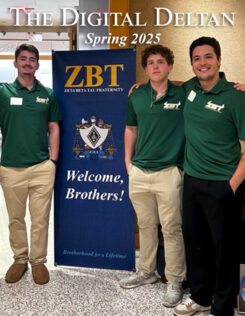 Spring 2025
Spring 2025 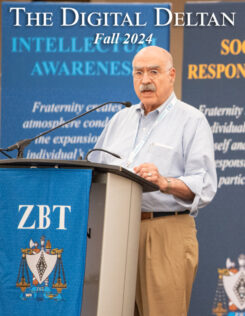 Fall 2024
Fall 2024  Spring 2024
Spring 2024 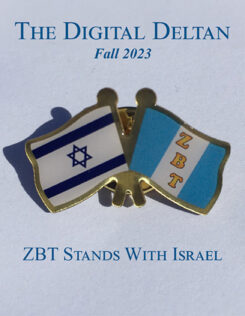 Fall 2023
Fall 2023 